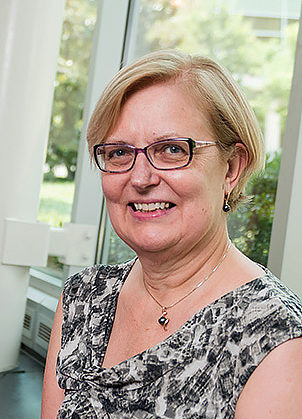
After nearly 30 years at Bell Labs, Professor Elsa Reichmanis decided she needed to “think about what I wanted to be when I grew up.”
Having risen to director of the materials research department at Bell Labs, she knew it was time to move on as the floor fell out of the telecom industry in the early 2000s.
Because she had enjoyed her interactions with students and postdoctoral researchers during her career, she began considering a move into academia and eventually joined the faculty of Georgia Tech’s School of Chemical & Biomolecular Engineering (ChBE) in 2008.
“Transitioning from an extended career in industry to an academic career can be challenging, but since I’d established a publication record and been visible in professional societies, that made it easier,” says Reichmanis, who had built connections with ChBE while participating in a review of the School a few years prior to becoming a professor.
Lifetime Achievement Award
Now holder of the Pete Silas Chair in Engineering at Georgia Tech, Reichmanis received the Margaret H. Rousseau Pioneer Award for Lifetime Achievement from the American Institute of Chemical Engineers (AIChE) in 2018 in recognition of her achievements as a woman in both academia and industry.
Because her background had been in chemistry, she says the award from chemical engineers caught her somewhat by surprise. “I see that as being special and significant,” says Reichmanis, who holds a PhD in organic chemistry from Syracuse University, where she earlier earned her bachelor’s degree.
Today her research group works at the intersection of chemical engineering, chemistry, and materials science – from fundamental concept to technology development and implementation. Her team’s focus areas include organic semiconductors, semiconducting polymers, intelligent optoelectronics, flexible batteries, biomaterials, and liquid crystals.
Given her years in industry, Reichmanis says she likes her research efforts to have the potential for real-world application. “I tend to think in terms of how what I’m doing can make an impact more broadly, thinking from a systems perspective. How do you integrate the different layers of materials that are needed for a device and how is the device going to work? We want to develop processes that are robust and reproducible, because without that, they’re not going to be transferrable to any industrial fabrication setting.”
Industry Perspective in Classroom
In the classroom, Reichmanis also draws upon her industry experience for her courses on Chemical Product Design and Sustainability in the Chemical Industry. “I get students to think through all the aspects of what they do,” she says.
She developed the sustainability course for undergraduates as part of Georgia Tech’s Serve-Learn-Sustain initiative. “The course provides a view of bringing green engineering into a traditional product design – how you can look at the life cycle inventory of what it takes to manufacture a product and all the natural resources that need to be extracted and all the chemicals needed to manufacture it,” Reichmanis explains.
“Where is the waste and what is the impact on environment and the impact on health? The course addresses improving product design but also thinking about the communities we’re living in and the economics. It’s a balance, and there’s no one right answer.”
Interest in the course has grown significantly since Reichmanis developed it a few years ago. “A lot of students are really engaged in exploring more about the social issues associated with chemical products and the environment.”
Reichmanis’ interest in sustainability extends to her research as well (e.g. integrating solar cells into high-capacity battery electrodes to improve energy harvesting and storage).
Numerous Achievements
Elected to the National Academy of Engineering in 1995, Reichmanis boasts a long list of awards and achievements throughout her career.
In 2018, Reichmanis won the American Chemical Society’s (ACS) National Award in the Chemistry of Materials, sponsored by DuPont. The award recognized her pioneering research in the design and development of polymer/organic materials and processes for advanced electronics and photonics.
She is a fellow of the American Chemical Society (ACS); the ACS Division of Polymeric Materials, Science and Engineering; and the American Association for the Advancement of Science. In 2003, she served as president of ACS.
As she transitioned into academia in 2008, she found the transition from the established environment of Bell Labs to building her own research group of graduate students who required training to be more challenging than expected. Today the Reichmanis Group includes a postdoctoral researcher and a dozen graduate students in chemical engineering, chemistry, and materials science and engineering.
While some alumni of her group have pursued academic careers, many have pursued opportunities in industry, finding employment at companies such as Intel, Applied Materials, Apple, SABIC, IBM Watson, and Illumina.
More than a decade into her academic career, Reichmanis now feels vastly more confident in the classroom. “Teaching students for the first time was a bit daunting at first because I’d never done it before. But once I got to know the students and developed rapport, it got a lot easier,” Reichmanis remembers.
Brad Dixon, braddixon@gatech.edu